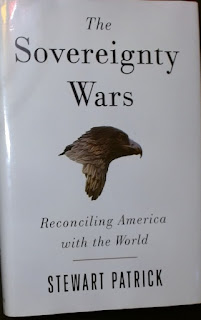This book review was written by Eugene Kernes
“The three core dimensions of sovereignty are authority, autonomy, and influence. Authority refers to the state’s exclusive and legitimate right to make rules. Autonomy refers to its ability to make and implement decisions independently. Influence refers to the state’s effective capacity to advance its interests.” – Stewart Patrick, Chapter 1: Introduction, Page 12
“While such trade-offs can be real, their gravity is often exaggerated. Too great a defensiveness against any perceived losses of U.S. sovereignty-as-autonomy or U.S. sovereignty-as-authority can be counterproductive if it deprives the Unites States of the opportunity to exercise its sovereignty-as-influence – that is, to shape its destiny in a global era.” – Stewart Patrick, Chapter 1: Introduction, Page 13
“Sovereignty brought welcome order to Europe. Beyond ending the wars of religion, it allowed the emergence of a stable “society if states” whose members recognized each other’s legitimate rights and (increasingly) resolved differences through diplomacy and international law. Sovereignty did not eliminate war. But it reduced its frequency and ferocity by narrowing its causes and moderating its conduct.” – Stewart Patrick, Chapter 2: There’s No Place Like Home, Page 33
Overview:
Sovereignty enabled different states to recognize each other’s legitimacy. Sovereignty is the ability to shape the state identity. Usually seen as zero-sum, whether a state can or cannot make certain decisions. When sovereignty is threatened, conflict ensues, with many claims made to defend sovereignty. But sovereignty has multiple dimensions, and trade-offs between them are positive-sum. The aspects of sovereignty are authority, autonomy, and influence. Authority is the ability of the state to legitimately make rules. Autonomy is the ability to make and implement decisions independently. Influence is the capacity of the state to advance its interests.
States can advance their interests and values through
international institutions and treaty obligations, or through state efforts and
more flexible cooperative arrangements.
It can be desirable to voluntary trade an aspect of sovereignty for
another aspect because of the superior benefits. Defending an aspect of sovereignty can be
very counterproductive. Governments have
been making trade-offs between the sovereignty aspects. International obligations would require
trading off autonomy, the freedom of action, for influence, the benefits of
cooperation. Many global issues cannot
be resolved with just state efforts.
Changing and trading sovereignty enables for more effective use of
sovereignty, and facilitates adjustments to different contexts.
The Act of Sovereignty:
Recognition of state sovereignty changed how political agents interact with each other. Credit for the sovereignty movement usually goes to the Peace of Westphalia of 1648. Before sovereignty, personal bonds defined political relations, and a complex system of overlapping authorities and jurisdictions. Sovereignty brought order to Europe, ended various wars, and enabled conflict to be resolved through diplomacy and international law. What sovereignty did was legitimate the rights of state relative to other states. As other states recognized each other’s legitimacy. Bringing about a stable society of states.
Sovereignty has 5 characteristics which are: 1) Supreme political authority within a given territory, which includes the only accepted use of armed force. 2) International legal recognition, as the states mutually recognize their political independence. 3) Autonomy in policy choices without external intervention. 4) Interdependence influence such as controlling cross-border flows. 5) Rule by consent of the governed, as people have delegated some of their power to chosen agents.
Sovereign authority is malleable, as authority can be
aggregated by states, and shared through international administration. Authority is not absolute and unitary. Authority claims are not fixed, but evolve
with state functions. To protect
sovereignty, a state can optout of participating in treaties, or gain special
privileges.
U.S. Sovereignty:
Transnational threats require international cooperation, but America takes a narrow self-interested posture. United States has been a global leader since WW2, but has relegated the responsibility. U.S. had a large role in the development of international cooperation, but also very defensive about its sovereignty. Using international law to make others behave more predictably, with appropriate enforcement, but resists subjecting themselves to the same constraints. A hypocrisy that makes Americans within the U.S. be seen as benevolent, while seen by foreigners with skepticism.
America needs to figure out a balance between independence and cooperation. To consider what commitments, and constraints it is willing to accept for a more rule-bound international order. What is needed to is understand how to shape America internally, while advancing interests globally.
As sovereignty has three dimensions, for the U.S. this means
difficult trade-offs between defending the U.S. constitution, protecting U.S.
freedom of action, and having control over outcomes. Historically, there were times that the U.S.
has exercised restraint which facilitated security and economic stability,
which also helped legitimize its own power and leadership. The U.S. has historically integrated itself
international systems of rules for its own interest. America has gained special privileges within
international rules to keep their sovereignty.
Caveats?
Examples of the aspects of sovereignty come primarily from the U.S. experience. Other states are referenced, but not enough. The aspects of sovereignty can be applied not only to states, but also to personal and business experiences. For individuals and businesses delegated certain decisions for cooperative benefits.
The book references many U.S. politically sensitive issues, which can make it hard to read parts of the book given the reader’s prior thoughts about the issues. As the author recognizes the sensitivity of the issues, some claims are counterproductive such as seeming readiness to dismiss claims that others find legitimate. The dismissal of certain views can make the reader defensive.
U.S. history is generally well represented, but world
history seems to be lacking. Prioritizing
sovereignty aspects and what they have enabled.
But the features were available before sovereignty as well. The source of sovereignty might have enabled
further promotion of legitimacy and negotiation ability, but those tactics have
existed much earlier.
